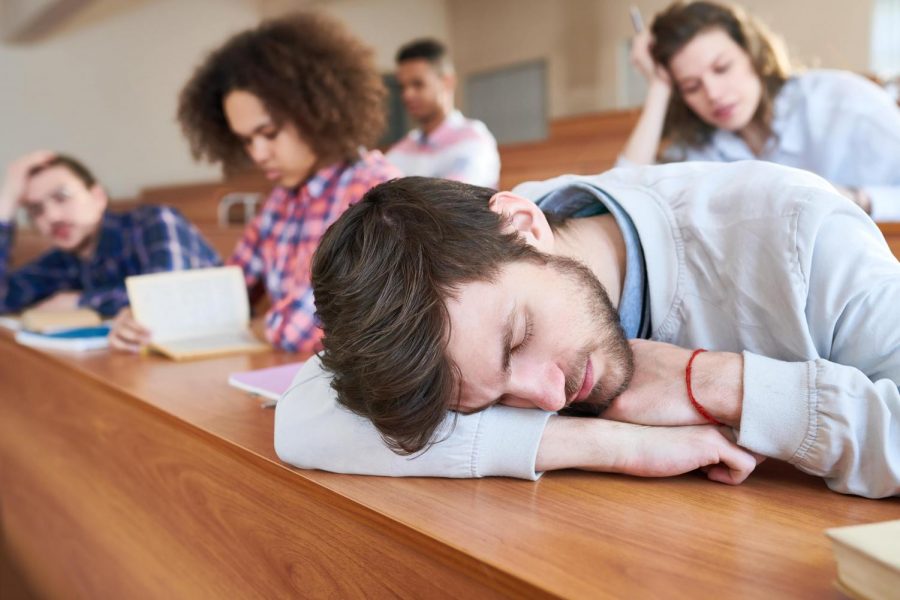Why We Should Push Back School Start Times
The Epidemic of Sleep Deprivation in Teens
The classroom is pictured as a bright and vibrant place full of ambitious and ready to learn students. However, we all know that this picture is far from reality in many classrooms and for many students. These expectations are simply not possible when tired and groggy students are walking into classrooms unfocused and unprepared for the day. Teens are experiencing a health epidemic, an epidemic of sleep deprivation.
The average high school teenager is getting between 7- 7 ¼ hours of sleep according to Nationwide Children’s HospitalNationwide Children’s Hospital. This comes over two hours short of the 9 ¼ hours of sleep that studies and experts have said teens need. As a high school student athlete, I find it very difficult to balance school work, practice, and a social life while getting enough sleep to be attentive for school and energized throughout the day.
It would be in the best interest of school districts to delay school start times to at least 8:30 a.m. for high schools and middle schools in order to improve student health, help students be more attentive in class, and aid in preventing motor vehicle accidents.
According to a 2006 poll2006 poll, 87 percent of high school students reported getting less than eight hours of sleep a night. The problem has since worsened due to technology and school demands leading the American Academy of Pediatrics to label teen sleep deprivation as a “national health epidemic” in a detailed study on teen sleep deprivation. Often the counter argument for delaying school start times is to advocate that students go to bed earlier and manage their time better. Although technology and distractions can play a part in going to bed late, it is a biological issue resulting from puberty. When adolescents hit puberty, their internal sleep clock moves back about two hours and the body does not produce melatonin in time for students to simply “go to bed earlier”. Because sleep is vital in helping regulate emotions, lack of sleep leads to mood disorders like anxiety, depression, and bipolar disorder. Suicide is the third leading killer for adolescents, and sleep deprivation has a strong link to suicidal thoughts/actions. According to various studies, this is independent of past issues with depression or drug/alcohol abuse. School districts need to account for the massive health benefits that come with pushing back school start times and letting students sleep in.
The effects of sleep deprivation in teens is also rolling over into the classroom and impairing students ability to focus and perform. Studies show that sleep loss in adolescent students worsens their ability to remember, concentrate, and problem solve. A study led by Stanford’s Mary Carskadon surveyed 3,000 students. In the survey it was found that students with higher GPA’s reported getting more sleep on weekdays as well as not sleeping in on weekends. Some students, however, do not have this option to go to sleep earlier.Data shows that if schools helped students sleep more through one hour later start times students grades, attendance, and sleep would increase. Sleep doesn’t just help teens learn when they are awake, it also makes sure information taken in during the day is learned and memorized. “We hypothesize that when teens sleep, the brain is going through processes of consolidation — learning of experiences or making memories,” says to Dr. Harry Yuan, “consolidating the important things and filtering out those unimportant things.”
Later start times could also prevent car accidents on the morning drive to school. When students are trying to maximize sleep while not being late to school, it often results in a rushed and chaotic morning. The crammed schedule often transfers into high risk and high speed driving. A 2014 study A 2014 study in Virginia found that students got in less car crashes in the school districts with later start times compared to those with earlier start times. An Australian study led by Alexandra Mariniuk found that teens who suffered the same amount of sleep deprivation as adults were more impaired when driving. Mariunik found that it only took six hours of sleep to render a teen driver impaired when driving due to lack of sleep. Sleep loss also increasing the odds of partaking in risky behaviors like drug and alcohol abuse which Mariunik suggests can lead to other impaired forms of driving far after school.
Changing school start times admittedly is not an easy task for administrators, however, it is not impossible. Boulder Valley School District ran in to many obstacles and take into account several factors when pushing for changing school start times. Food service contracts, after school activities, and bussing schedules were just a few. Cherry Creek also had to deal with the change in bussing schedules by making elementary students start earlier, essentially switching the start times for high schoolers and elementary students which could have negative affects on younger students. In Jeffco county, a shortage of buss drivers is a concern for many residents in the school districts. The district would have to increase spending in order to keep up with the changes in start times. Only 14% of residentsOnly 14% of residents were ok with any amount of cost in order to push back start times. As of now the only way to get the funding for the schedule changes would be to take it out of the classroom which isn’t an option at the time for Jeffco according to Jeffco Officials. However, many school districts have been successful across the country including in Colorado with Cherry Creek (over 55,000 students) and Boulder Valley (30,000) have pushed back start times despite the obstacles. Not only did Cherry Creek push back start times, they have also measured significant success in regards to improvement of student attentiveness and happiness.
Lack of sleep in teens is a national epidemic and must be addressed beginning with school start times. The American Academy of Pediatrics has strongly urged schools across the country to start high school days no earlier than 8:30. There will be significant push back, but the health and well being of students should take priority over avoiding rescheduling obstacles. By delaying the school day we can drastically improve the mental health of students while improving their performance in class, overall health and happiness, and keeping them safe on the road.
Contact your school district superintendent or school board and relay the facts about the sleep deprivation epidemic in students while encouraging them to take the first steps to take the issue head on.





